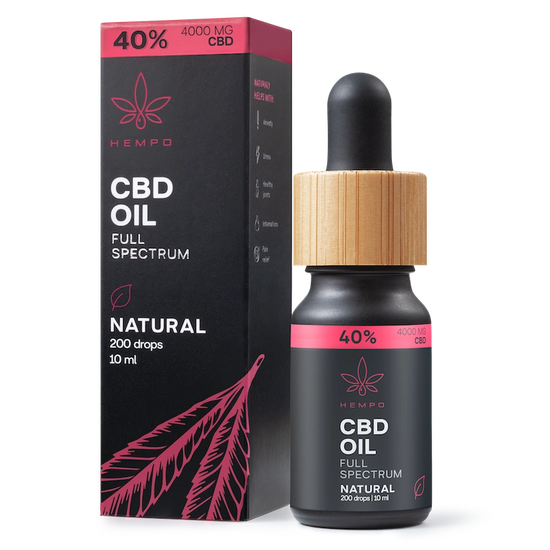CBD and epilepsy: the benefits of hemp not everyone knows about
Scientific studies indicate that CBD may be beneficial for people with extremely rare forms of epilepsy, as it helps reduce the activity and frequency of seizures. CBD may be useful in alleviating various epilepsy symptoms due to its interaction with the endocannabinoid system (ECS).
If you or a member of your family suffers from epilepsy, seizures or other seizures associated with this disease, CBD for epilepsy may be the most direct road to good well-being. CBD oil is a product that is becoming increasingly popular in Lithuania and around the world. It provides promising results in the fight against the symptoms of epilepsy and many other diseases. How can CBD help with epilepsy, and what do you need to know before using this product?
The article discusses what epilepsy is, frequently asked questions about CBD and epilepsy, what MCT coconut oil is, and provides recommendations on choosing CBD oil.
Table of Contents
Note: This and other articles on Hempo's blog are for informational purposes only. According to the directive of the European Commission, cannabidiol is classified as a 'novel food', therefore CBD products should not be used as a food supplement in Lithuania.
What is epilepsy
Epilepsy is the fourth most common neurological disorder in the world. It is a serious brain disorder that causes repeated, unprovoked seizures. Most often, they manifest as convulsive episodes.
Seizures can affect your safety, personal relationships, work, driving, etc. So, it is very important that patients are able to recognize various everyday situations in which seizures are more likely. These factors may include:
- departing from the established daily routine (e.g. travelling to a country with a different time zone);
- lack of sleep - overwork, sleep disorders, irregular sleep rhythm, etc.;
- acute and chronic diseases, infections, inflammations;
- flashes of light (e.g., in a nightclub or driving at night);
- alcohol, including heavy alcohol consumption or sudden cessation of alcohol consumption, if addiction has already developed;
- use of psychoactive products (drugs);
- constant tension, stress;
- menstrual cycle disorders, irregularity or other hormonal changes.
A doctor can diagnose epilepsy if you have two or more unprovoked seizures, or one, but with a higher risk. That being said, it is important to remember that not all seizures are a consequence of epilepsy. Seizures can be related to brain injury or inherited genetically, but the cause is often difficult to determine. Is CBD and epilepsy related?

CBD and Epilepsy: Answers to Frequently Asked Questions
-
What is CBD?
CBD is a cannabinoid, a chemical found in the hemp plant. It should not be confused with another well-known hemp product, tetrahydrocannabinol (THC). This chemical in hemp provides an intoxicating effect, can affect mental health and cause hallucinations.
Meanwhile, cannabidiol does not have hallucinogenic properties and is safe for patients with various conditions, athletes and people who use CBD simply for prevention.
-
Does cannabidiol really provide tangible benefits to the body?
The short answer is absolutely yes. CBD can help prevent some types of seizures in epilepsy and is applicable not only to humans but also to animals.
A 2018 clinical trial involving people with different forms of epilepsy showed that patients who regularly used CBD to treat various forms of epilepsy had a significant reduction in seizures.
Research in other areas is still in its early stages, but there are indications that CBD may help prevent other types of seizures or increase the effectiveness of other anti-epileptic drugs.
CBD alleviates the symptoms of epilepsy, but it also has other properties that may be relevant to patients. It calms the body, helps overcome stress, relaxes, improves sleep, provides anti-inflammatory effects and reduces or even eliminates body pains of various origins.
-
How does CBD help prevent epileptic seizures?
The positive effects of CBD in epilepsy are association with the human body's natural endocannabinoid system (ECS), which consists of neurotransmitters and receptors known as endocannabinoids. CBD is thought to bind and interact with the ECS when ingested. This system has been found to impact different body functions and systems, including immune response, appetite, pain, sleep and many other vital functions.
-
How to use CBD oil to treat epileptic seizures?
If you suffer from a severe form of epilepsy (e.g. Dravet syndrome), it is crucial to discuss with your neurologist whether CBD products are good for you and at what intensity you should use them.
Although cannabidiol is almost always free of side effects and safe to use, there is some risk of interactions between CBD and your prescription medications. Depending on your epilepsy, it is best if CBD is monitored and adjusted as needed by your doctor.
Does CBD Interact with Epilepsy Medications?
CBD for Dravet Syndrome
CBD for Tuberous Sclerosis Complex (TSC)
Can CBD Increase Epilepsy Seizures?
For the best effect - MCT oil
CBD oil is often mixed with MCT oil for even better results. The full name of MCT is medium chain triglycerides. In Lithuanian, MCT is also known as medium-chain triglycerides.

What is MCT? Is there a connection between CBD and epilepsy?
Generally speaking, MCTs are healthy fats that are mostly extracted from coconuts. They have many beneficial properties: improve digestion, regulate weight and nutrition, lower the level of bad cholesterol in the blood and improve concentration. That's why MCT oil is widely used as a food supplement.
MCT oil is also found to be a good carrier of CBD. It means that MCTs increase the effectiveness of cannabidiol, thus making it even more effective in reducing epileptic seizures:
- Accelerates the absorption of CBD. MCT molecules are small, which makes them easier for the human body to absorb. Meanwhile, pure CBD is more difficult for the body to absorb - its bioavailability is quite low. CBD is mixed with MCT to absorb the benefits of cannabidiol in the body as efficiently as possible. This oil ensures that CBD will be carried around the body faster and accelerates its interaction with endocannabinoid receptors;
- Enriches the good properties of CBD. As we mentioned, MCTs have unique health benefits. These properties, combined with the benefits of CBD, further enrich and strengthen the body. It is especially important for diseases such as epilepsy.
We can conclude that CBD and epilepsy are linked.
Which one is the best CBD oil?
Today, you can buy several types of products in Lithuania: CBD isolate, broad-spectrum oil and full-spectrum oil. CBD isolate has the weakest effect because it contains only CBD, without additional cannabinoids, terpenes and other beneficial additives.
Broad-spectrum CBD oil contains other non-hallucinogenic cannabinoids, terpenes and beneficial additives, making it one of the best choices. Meanwhile, full-spectrum CBD oil has the most intense effect. It contains a small amount of THC, so it cannot be used by pregnant women, nursing mothers and professional athletes.





